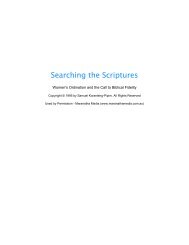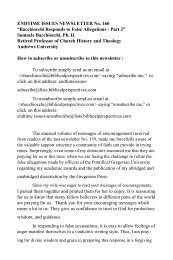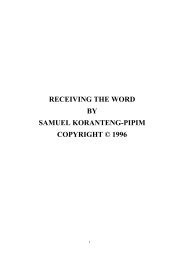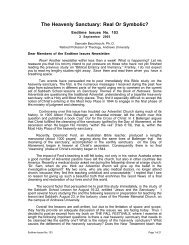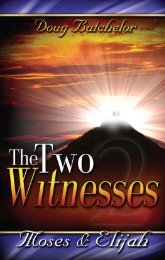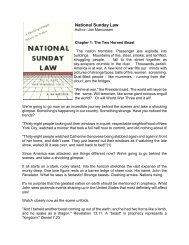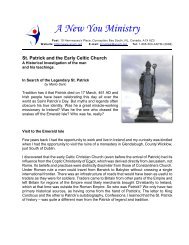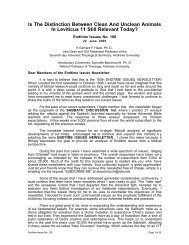Bible Readings for the Home Circleâ1914 - A New You Ministry
Bible Readings for the Home Circleâ1914 - A New You Ministry
Bible Readings for the Home Circleâ1914 - A New You Ministry
You also want an ePaper? Increase the reach of your titles
YUMPU automatically turns print PDFs into web optimized ePapers that Google loves.
BIBLE READINGS<br />
<strong>New</strong>s (Episcopalian), July 2, 1894.<br />
For additional testimonies, see reading on page 454.<br />
14. How did this change in observance of days come about, suddenly<br />
or gradually<br />
Gradually.<br />
NOTES.— “The Christian church made no <strong>for</strong>mal, but a gradual and<br />
almost unconscious transference of <strong>the</strong> one day to <strong>the</strong> o<strong>the</strong>r.” “The<br />
Voice From Sinai,” by Archdeacon F. W. Farrar, page 167.<br />
This of itself is evidence that <strong>the</strong>re was no divine command <strong>for</strong><br />
<strong>the</strong> change of <strong>the</strong> Sabbath.<br />
15. For how long a time was <strong>the</strong> seventh-day Sabbath observed in <strong>the</strong><br />
Christian church<br />
For many centuries. In fact, its observance has never wholly ceased<br />
in <strong>the</strong> Christian church.<br />
NOTES.— Mr. Morer, a learned clergyman of <strong>the</strong> Church of England,<br />
says: “The primitive Christians had a great veneration <strong>for</strong> <strong>the</strong> Sabbath,<br />
and spent <strong>the</strong> day in devotion and sermons. And it is not to be doubted<br />
that <strong>the</strong>y derived this practice from <strong>the</strong> apostles <strong>the</strong>mselves.” “Dialogues<br />
on <strong>the</strong> Lord’s Day,” page 189.<br />
Prof. E. Brerwood, of Gresham College, London (Episcopal), says:<br />
“The Sabbath was religiously observed in <strong>the</strong> Eastern church three<br />
hundred years and more after our Saviour’s passion.” “Learned Treatise<br />
of <strong>the</strong> Sabbath,” page 77.<br />
Lyman Coleman, a careful and candid historian, says: “Down even<br />
to <strong>the</strong> fifth century <strong>the</strong> observance of <strong>the</strong> Jewish Sabbath was continued<br />
in <strong>the</strong> Christian church, but with a rigor and solemnity gradually<br />
diminishing until it was wholly discontinued.” “Ancient Christianity<br />
Exemplified,” chap. 26, sec. 2.<br />
The historian Socrates, who wrote about <strong>the</strong> middle of <strong>the</strong> fifth<br />
century, says: “Almost all <strong>the</strong> churches throughout <strong>the</strong> world celebrate<br />
<strong>the</strong> sacred mysteries on <strong>the</strong> Sabbath of every week, yet <strong>the</strong><br />
Christians of Alexandria and at Rome, on account of some ancient<br />
tradition, refuse to do this.” “Ecclesiastical History,” book 5, chap.<br />
22.<br />
Sozomen, ano<strong>the</strong>r historian of <strong>the</strong> same period, writes: “The people<br />
of Constantinople, and of several o<strong>the</strong>r cities, assemble toge<strong>the</strong>r on<br />
<strong>the</strong> Sabbath as well as on <strong>the</strong> next day; which custom is never observed<br />
at Rome.” “Ecclesiastical History,” book 7, chap. 19. {443<br />
443}<br />
All this would have been inconceivable and impossible had <strong>the</strong>re<br />
been a divine command given <strong>for</strong> <strong>the</strong> change of <strong>the</strong> Sabbath. The last<br />
two quotations also show that Rome led in <strong>the</strong> apostasy and in <strong>the</strong><br />
change of <strong>the</strong> Sabbath.<br />
16. What striking testimony is borne by Neander, <strong>the</strong> noted church<br />
historian, regarding <strong>the</strong> origin of <strong>the</strong> Sunday sabbath<br />
THE CHANGE OF THE SABBATH<br />
“Opposition to Judaism introduced <strong>the</strong> particular festival of Sunday<br />
very early, indeed, into <strong>the</strong> place of <strong>the</strong> Sabbath. . . . The festival of Sunday,<br />
like all o<strong>the</strong>r festivals, was always only a human ordinance, and it was<br />
far from <strong>the</strong> intentions of <strong>the</strong> apostles to establish a divine command in this<br />
respect, far from <strong>the</strong>m, and from <strong>the</strong> early apostolic church, to transfer<br />
<strong>the</strong> laws of <strong>the</strong> Sabbath to Sunday. Perhaps at <strong>the</strong> end of <strong>the</strong> second century<br />
a false application of this kind had begun to take place; <strong>for</strong> men appear<br />
by that time to have considered laboring on Sunday as a sin.” Neander’s<br />
“Church History,” Rose’s translation, page 186.<br />
17. Who first enjoined Sunday-keeping by law<br />
Constantine <strong>the</strong> Great.<br />
NOTES.— “The earliest recognition of <strong>the</strong> observance of Sunday as a<br />
legal duty is a constitution of Constantine in 321 A.D., enacting that all<br />
courts of justice, inhabitants of towns, and workshops were to be at<br />
rest on Sunday (venerabili die Solis), with an exception in favor of<br />
those engaged in agricultural labor.” Encyclopedia Britannica, ninth<br />
edition, article “Sunday.”<br />
“Constantine <strong>the</strong> Great made a law <strong>for</strong> <strong>the</strong> whole empire (321 A.D.)<br />
that Sunday should be kept as a day of rest in all cities and towns; but<br />
he allowed <strong>the</strong> country people to follow <strong>the</strong>ir work.” Encyclopedia<br />
Americana, article “Sabbath.”<br />
“Unquestionably <strong>the</strong> first law, ei<strong>the</strong>r ecclesiastical or civil, by which<br />
<strong>the</strong> Sabbatical observance of that day is known to have been ordained,<br />
is <strong>the</strong> edict of Constantine, 321 A.D.” Chambers’s Encyclopedia, article<br />
“Sabbath.”<br />
18. What did Constantine’s law require<br />
“Let all <strong>the</strong> judges and town people, and <strong>the</strong> occupation of all trades<br />
rest on <strong>the</strong> venerable day of <strong>the</strong> sun; but let those who are situated in <strong>the</strong><br />
country, freely and at full liberty, attend to <strong>the</strong> business of agriculture;<br />
because it often happens that no o<strong>the</strong>r day is so fit <strong>for</strong> sowing corn and<br />
planting vines; lest <strong>the</strong> critical moment being let slip, men should lose <strong>the</strong><br />
commodities granted by heaven.” Edict of March 7, 821 A.D., Corpus<br />
Juris Civilis Cod., lib. 3, tit. 12, 3.<br />
NOTE.— This edict, issued by Constantine, under whom <strong>the</strong> Christian<br />
church and <strong>the</strong> Roman state were first united, in a manner supplied <strong>the</strong><br />
lack of a divine command <strong>for</strong> Sunday observance, and may be considered<br />
<strong>the</strong> original Sunday law, and <strong>the</strong> model after which all Sunday<br />
laws since <strong>the</strong>n have been patterned. It was one of <strong>the</strong> important steps<br />
in bringing about and establishing <strong>the</strong> change of <strong>the</strong> Sabbath. {444<br />
444}<br />
19. What testimony does Eusebius (270–338), a noted bishop of <strong>the</strong><br />
church, a flatterer of Constantine, and <strong>the</strong> reputed fa<strong>the</strong>r of ecclesiastical<br />
history, bear upon this subject<br />
“All things whatsoever that it was duty to do on <strong>the</strong> Sabbath, <strong>the</strong>se we




